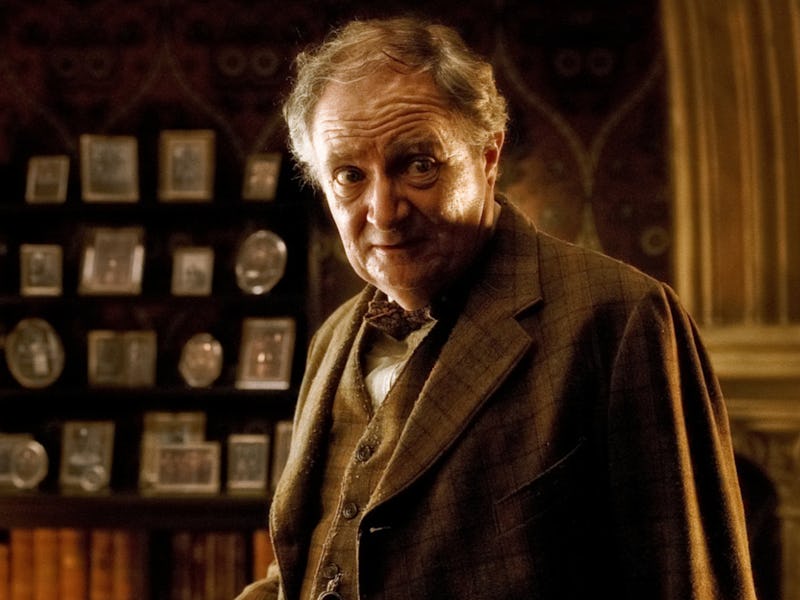Harry Potter theory reveals how Hogwart's meekest professor fought Voldemort
Did Slughorn use some liquid luck during the Battle of Hogwarts?

Horace Slughorn may be smarter than Harry Potter fans give him credit for. The Hogwarts teacher plays a vital role in the Harry Potter series, as it’s through his memories that Harry and Dumbledore discover the existence of Voldemort’s Horcruxes.
Slughorn also plays a crucial role in the story, giving Harry a small batch of Felix Felicis (aka, “Liquid Luck”) in Half-Blood Prince. Harry not only uses to persuade Slughorn into giving him those memories, but also shares the potion Ron, Hermione, and Ginny to protect them during the Death Eater attack on Hogwarts at the end of the sixth book.
But as smart and narratively important as Slughorn may be, the one thing he's not is a fighter. So how do you explain his decision to stand up to Voldermort at the end of Harry Potter and the Deathly Hallows? Especially after he stood down when challenged by Professor McGonagall moments earlier in that same book? Over a decade after the novel's release, we may finally have an answer.
Jim Broadbent in Harry Potter and the Half-Blood Prince.
The Theory — A new Harry Potter fan theory speculates Harry and his friends weren't the only ones to use Felix Felicis during the books. What if Slughorn dosed himself during the Battle of Hogwarts?
Slughorn is one of the notable Hogwarts teachers who helps fight Voldemort’s forces during the climactic Battle of Hogwarts in Deathly Hallows, and alongside McGonagall and Kingsley Shacklebolt, engages in a duel with the Dark Lord near the end of the book.
Redditor u/EquivalentInflation believes that the reason Slughorn was able to hold his own during said duel against Voldemort was because he secretly drank some Felix Felicis prior to the battle. The theorist suggests that the potion is what gave Slughorn the boost in confidence and skill needed to face his former star student.
Jim Broadbent in Harry Potter and the Half-Blood Prince.
The Evidence — As the theory points out, Slughorn is not a particularly brave man, nor is he known for doing selfless things, which makes his courageous behavior during the climax of Deathly Hallows all the more surprising. For years, fans have chalked it up to Slughorn just rallying around his fellow colleagues and students in taking a stand against Voldemort. But it’s entirely possible that he may have gotten a helpful boost in courage via a dose (or two) of Felix Felicis.
In Half-Blood Prince, Slughorn offers a vial containing several hours’ worth of Felix Felicis as a prize to whichever of his students could brew the best potion. Harry ended up winning that contest — thanks to some helpful notes from Snape’s old schoolbook. But if Slughorn was able to brew Felix Felicis for class, it’d be safe to assume that he could do it again for himself. Slughorn even admits to having used the potion previously at two different times in his life — once when he was 24 and again when he was 57.
Additionally, one keen-eyed redditor noted that Jim Broadbent’s Slughorn can be seen drinking something in a scene from Harry Potter and the Deathly Hallows Part 2 at around the same time that McGonagall and the other Hogwarts staff are preparing for the battle with Voldemort. You can see the moment for yourself at the 17-second mark of the video below. However, it should be noted that the duel between Slughorn, McGonagall, Kingsley, and Voldemort was not included in the Deathly Hallows Part 2 film. So it’s hard to say for certain that this earlier cinematic moment itself adds any validity to this theory.
The Inverse Analysis — Felix Felicis is an incredibly complex potion, but Slughorn is a proven potions master. So the difficulty in its creation doesn’t really factor into this theory. It's very plausible this potion's professor had some extra Felix Felicis stored amongst his personal supply — despite the fact that Felix Felicis was regulated by the Ministry of Magic.
It would also be in keeping with Slughorn’s personality for him to take some of the potion before a major conflict — if only in the hopes that it would keep him from dying.
So despite the fact that this theory may never be explicitly proven to be true — it’s undoubtedly persuasive... and the evidence is there for it. Whether or not Harry Potter fans choose to believe it, is up to them — at least until J.K. Rowling inevitably weighs in on Twitter.
This article was originally published on